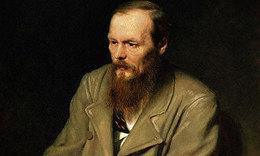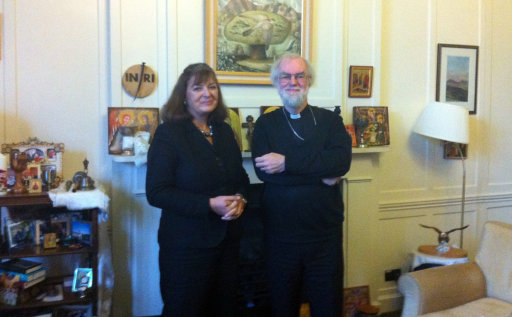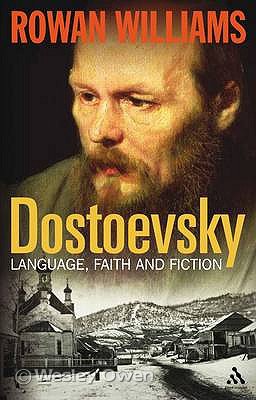Archbishop on Dostoevsky - Radio 4's 'One to One' programme

Tuesday 27th December 2011
BBC diplomatic correspondent Bridget Kendall interviews Archbishop Rowan Williams about his fascination with the 19th-century Russian novelist Fyodor Dostoevsky in 'One to One' on BBC Radio 4.
The series 'One to One' allows broadcasters to follow their personal passions by talking to others with special knowledge and expertise in the same field of interest.
In this episode, former Russian scholar Bridget Kendall meets with the Archbishop of Canterbury to discuss Dostoevsky and how the author's work relates to Dr Williams' own life and work.
Listen to the programme at the BBC Radio 4 website or read a transcript below.

Bridget Kendall with Archbishop Rowan Williams.

'Dostoevsky: Language, Faith and Fiction' by Rowan Williams was published in 2008.
A transcript of the conversation between Bridget Kendall (BK) and Dr Rowan Williams (RW) follows.
BK: | It’s a damp morning by the River Thames, in London, but here inside the wood-panelled rooms of Lambeth Palace I feel well cocooned from any outside wintry weather. I’m in the private study of the Archbishop of Canterbury, and there’s a clue about why I’m here on the mantelpiece—a row of Russian icons. Because I’ve come here to talk to Rowan Williams about an interest that many people may not realise he has—his deep knowledge of Russian literature and philosophy. I’ve often thought that we’re too quick to pigeon-hole people and to label them with the one thing they’re best known for, when in fact many people may have a second string to their bow, either through a second career or a passion that they find time to pursue in parallel. And that’s what I’m keen to explore in this first of three conversations. Archbishop, I know you’ve had a long interest in Russian spirituality, you wrote a doctorate on Russian Christianity, and a few years ago you took off three months to write a book about Dostoevsky. I was intrigued when I heard you’d done that because I didn’t think being Archbishop of Canterbury was the sort of job that you could take time off. |
RW: | There are things you can’t take time off from, what St Paul in the New Testament calls the ‘care of all the churches’—you don’t stop anxiety, you don’t stop the concern about what’s happening. But there is, I think, an understanding that archbishops, like bishops and clergy, need a bit of time out to reflect, and I was very glad to have the opportunity of that. |
BK: | And what was it about Russian writers and thinkers that first attracted you? |
RW: | I suppose the interest in Russia goes back a very long way to watching some of Eisenstein’s films on television when I was a little boy, well, when I was a young teenager I suppose. And suddenly being absolutely gripped and fascinated by Russia and by two things—one, the sheer strangeness of it, the sheer exotic quality of it, but also the sense of enormous seriousness about things. A sense of the tragic, a sense of the extreme. Reading Dostoevsky for the first time in my teens, it was that sense of the extreme, I guess, which really engaged me. This pushes questions to the edge. |
BK: | It’s interesting you say that about the strangeness of it because Russian literature is also something of a passion for me. I started out studying it full time until I gave up the idea of being an academic and somehow found myself as a BBC news journalist. But I think I was always attracted to Russia from the very beginning for its sense of otherness—that it was another place. At that time, of course, it was the Cold War, it was a political otherness, and I was intrigued to get beyond the barrier to see what was on the other side. But your interest, presumably, was less political? |
RW: | Indeed. And one of the things I found quite a challenge as I was growing up was putting together the Russia that I was getting to know a bit through novels, through music and history, and this Russia that I was presented with in the newspapers and the news programmes every day, which didn’t seem to connect very easily with the Russia I was reading about. And, I suppose, some of the impulse for researching Russian Christianity was to understand that tension a bit better, and to understand better how the whole history of Russia is actually a series of tensions and unresolved ruptures. |
BK: | So, do you find that this knowledge that you have of Russian spirituality, does that sort of seep through to your other work as an Anglican theologian and clergyman, and now as Archbishop of Canterbury? |
RW: | The Russian dimension has always impacted quite a lot on my own theological thinking. And indeed on my prayers, I suppose, because, again as a young student, I read that celebrated 19th century classic ‘The Way of the Pilgrim’—the description of a peasant wandering through Russia learning about the techniques of prayer from the great old men, the elders, the sages. The techniques and visions of prayer there made immediate sense and rang bells for me, and that too was a door into another world which remains very much open for me. |
BK: | So are you saying, then, that Russian spirituality offers something that you don’t get here in Britain? |
RW: | Russian spirituality, I think, offers a number of things which, at the very least, bits of western tradition rather overlay, or occlude. There’s the long-standing, very deep-rooted tradition, not just Russian but universal in the Christian east, of the prayer of Jesus—the repetition of the formula “Lord Jesus, have mercy on me”, the attention you pay to your breathing in almost a yogic kind of way. That very deep-rooted tradition is something which lots and lots of western Christians have recovered more recently. But I think also the powerful sense in, again, eastern Christianity generally but Russian Christianity in particular, of the things of this world being shot through with puzzle, beauty, mystery, danger. The liturgy as a great drama—worship as not just addressing a few well-chosen remarks to God but being caught up in something, in the fullest sense, theatrical. That, again, matters quite a bit to me and it’s not something which the western tradition has always been good at. |
BK: | So, choosing to write a book about Dostoevsky, Dostoevsky of all people—a novelist with big, baggy novels, the most difficult, perhaps, of all the classic Russian writers—why did you go for him? |
RW: | I suppose because he was the first Russian novelist I read seriously, and was completely compelled by as I read. That sense of, as I said earlier, pushing to the extremes, that sense of putting the question as starkly as possible—I think that’s part of what I valued in him. And reading for the first time ‘The Grand Inquisitor’ fable in ‘The Brothers Karamazov’, that great statement of how the church and Jesus can find themselves completely at odds, that’s just one of those things that ought to go on worrying you for the rest of your life if you’re a Christian. |
BK: | But you know, I was intrigued that you should choose Dostoevsky because, I suppose from my own study of him, I think of Dostoevsky and what was important about him is that this was a novelist who managed to find a new way of writing a novel which is, as it’s called, polyphonic. So all his different characters have different views, and actually there’s the narrator in there too—but no-one gives you one view. And so it’s a multiple view of the world. It doesn’t add up to a conclusion. It revels in uncertainty and unpredictability. |
| And I sort of thought, when I heard the Archbishop of Canterbury was a Dostoevsky fan and was writing a book, I thought “Well, a polyphonic view of the world isn’t exactly, surely, a view of the world that says there is one God and there is one vision”. It didn’t seem to match. |
RW: | One thing, of course, about the word polyphony itself, is it’s a plurality but it’s not a chaos. And I think you can say that about Dostoevsky’s novels. The voices are allowed their full range. Dostoevsky doesn’t step in and say “I’m sorry I can’t entertain that view” or “I’m sorry I don’t think that’s an appropriate thing to say”. |
BK: | Everything’s appropriate in Dostoevsky. |
RW: | Anything goes, in a sense. He will allow the argument to unroll to its final conclusion hence, of course, the great Grand Inquisitor confrontation. |
BK: | The ultimate blasphemy. |
RW: | The ultimate blasphemy, the representative of the Church and Jesus confront each other and face off. So he allows—he invites—blasphemy, transgression, extremity, again. And what makes it not chaos is not that it all ties up into a happy ending, or that you can extract a theory from it, but that throughout the books there are—if you want to receive it—figures who organise the chaos around themselves. The threads lead towards them. They’re not people who direct the action or even often change the action very much, but they give you a perspective. You don’t have to occupy it, but Dostoevsky is saying “There it is”. There is the presence of holiness, there is something which potentially allows you to understand the chaos. You don’t have to believe it, you don’t have to accept it, but there it is. And the image that really struck me about that was a Russian theologian and critic called Pavel Evdokimov, who wrote a very interesting book on Dostoevsky and the problem of evil in the 1940s. He says the saints in Dostoevsky are literally like icons. Their face is on the wall. They don’t act to turn events and control events, they’re just there. |
BK: | You see I wonder if we’re reading Dostoevsky, both of us, in a very different way, because it sounds from what you’re saying as though every one is almost an emblem to put forward a point of view, whereas what I find is that characters are so complex, and so wilful, that’s what’s wonderful about them—that they don’t actually stand for a point of view. They’re telling you one thing but then the next minute they say “Well actually I didn’t mean that, I was lying” or “I’ve changed my mind”. |
RW: | I wouldn’t at all say they’re emblems, far from it. The polyphony goes right into people, the different voices are in the same head as often as not. So it’s not that people are representing views, that it’s just a dramatized argument. But I think that what he’s doing is letting people have their heads, letting them run along with arguments. It’s a bit like what somebody said about poetry in general, “How can I know what I think until I hear what I say”? People try things out, they try on different identities. And Dostoevsky is very, very good at not trying to give you illegitimate access to the insides of their heads, you just have to watch them and listen to them. So I wouldn’t at all say they’re just artificial depictions of points of view, far from it. |
BK: | Bu then you could come to very, very different conclusions from the novel. You could say it’s an affirmation of your faith, others could say “This seems to me to underlie my doubt in faith”. |
RW: | That’s right. I think that’s why I say that he gives you a perspective within the novel which, potentially, can hold it together. But he doesn’t say you’ve got to accept it, because that would be for him to stop being a novelist. |
BK: | You know, it seems a long way from the public debates of our age that you, as Archbishop of Canterbury, get drawn into—who should bear responsibility for the financial crisis, or whether the church should back or move on anti-capitalist protesters outside a cathedral, or divisions within the Anglican world over female bishops and so on. Does having spent so much time in the world of Dostoevsky have an impact on your thinking when you deal with these things? |
RW: | It gives you a perspective. It’s a reminder, certainly, that what’s significant about faith or Christianity is actually not the headline-driven concerns of the day, it’s something to do with how human beings confront their anguish. And that’s why faith matters. So at the very basic level, that’s a perspective which this gives. Also, I think, it conveys the sense that you need some caution in assuming that one side of any argument is unequivocally God’s perspective. That can make you wishy-washy, it can also just give you a salutary humility, stepping back from saying “This is the word of the Lord”. Now Dostoevsky himself, when he turned to his journalism, was all too prone to do exactly that, of course. He hadn’t read his own novels, you might say— or he hadn’t understood what he was saying. |
BK: | That’s so interesting that you say that because it sort of reinforces my thesis in having these conversations—that you shouldn’t pigeon-hole people because they’re always more than one person, they’re always polyphonic, if you like. |
RW: | Yes. |
BK: | And how enlightening to hear the Archbishop of Canterbury say that he finds works of fiction, the works of Dostoevsky, useful in trying to get to grips with the world. Because the world of fiction allows it to be impossible and paradoxical, and I suppose I’d never expected to hear a former professor of divinity and head of the Church of England say that this was helpful. |
RW: | I think it would be a very terrible thing if religious faith meant that you saw people in a less three-dimensional way than you would otherwise. Fiction helps you to understand that whatever the principles, whatever the standing rules and perspectives on the moral and the spiritual life, human beings are every bit as unpredictable as Dostoevsky sets out—that they resist rational cataloguing and categorisation, and they often resist reasonable solutions. And you don’t begin to understand humanity unless you understand that thread of wildness that’s in it all. And because I believe, as a Christian, that my faith obliges me to engage with every area of human life and human experience, fiction is a crucial part of nourishing my faith. |
BK: | Archbishop Rowan Williams, thank you so much for this conversation. |
RW: | Thank you. |
